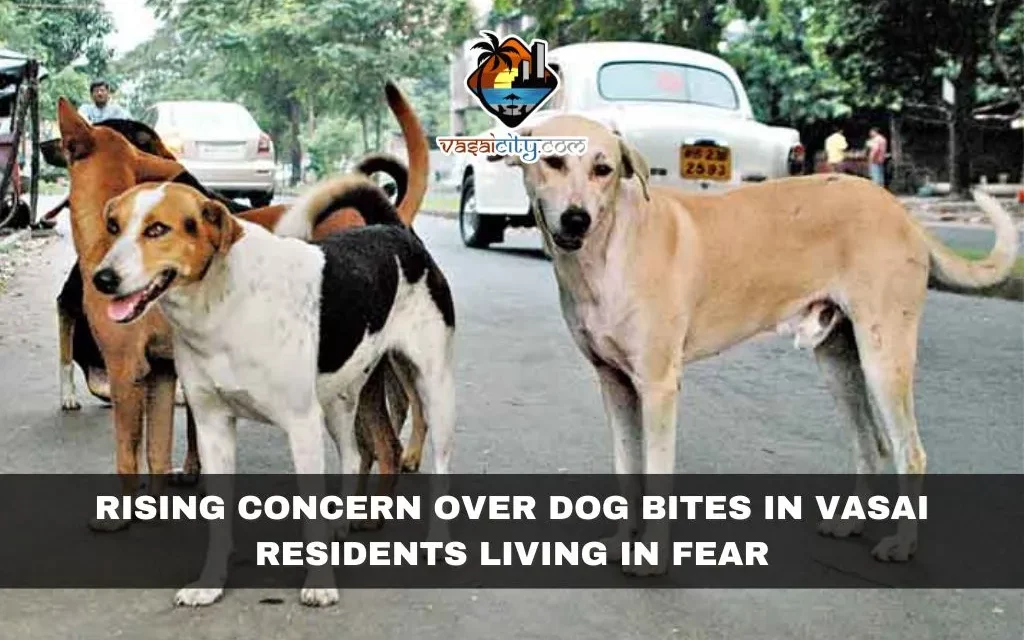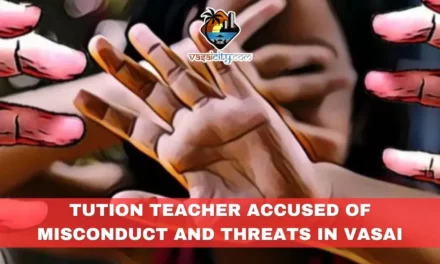The increasing number of dog bite cases in Vasai taluka has become a major concern for local residents, who fear dog attacks in the streets. Despite efforts by civic officials to conduct dog sterilization programs, the dog population continues to grow.
Vasai taluka, which includes Vasai, Nalasopara, and Virar, has eight Primary Healthcare Centers (PHCs) run by zila parishad. Since April, these PHCs have reported a total of 2,422 dog bite cases. The hotspot for these cases is Arnala in Virar West, where many stray dogs roam freely near the seaside.
On average, each PHC sees at least 10 dog bite cases daily in Vasai taluka. A medical officer at Agashi PHC in Virar explained, “We’ve been quick to provide treatment to the victims. The dogs are so aggressive that they can cause severe injuries, mainly to children and the elderly, who become terrified instantly.”
A senior doctor from Palghar zila parishad, speaking anonymously, said, “It’s the municipal corporation’s responsibility to control the dog population through sterilization programs, but there’s a severe lack of infrastructure and the will to eliminate the dog menace.”
“Vasai taluka has a mix of urban and rural populations. While the PHCs are primarily for urban areas, we’ve been accommodating patients from urban setups as we cannot refuse those in need of urgent medical attention,” the senior doctor added.
“We’ve raised this issue with the Vasai Virar City Municipal Corporation multiple times to provide facilities for treating dog bite cases, but no action has been taken. Patients come to our PHCs because they claim that civic-run hospitals lack the necessary medicines to treat dog bite cases,” said another senior doctor.
A senior civic official claimed, “We’ve been conducting a sterilization program for stray dogs in Vasai, Virar, and Nalasopara. A total of 2,454 stray dogs have been sterilized between June and September,” said Dr. Charushila Pandit, deputy municipal commissioner in VVCMC.
However, a local resident of Vasai, Praveen Nalawade, expressed skepticism, saying, “I wonder how dog bite cases continue to rise when 2,454 dogs have been sterilized. This data appears to be inaccurate, as we face the dog menace every day. I’m afraid to let my children play in the field due to the increasing dog bite cases.”
Nineteen-year-old college student Sneha Mia shared her experience, “I was bitten by dogs as a child, and a few months ago, stray dogs bit me again. I’m very scared these days, as packs of dogs wait for humans in the middle of the road.”
“I have to attend college in Bandra, so I leave early in the morning. However, I can’t go out alone because the dogs chase you relentlessly. I have to wait for a passerby to help me cross the road,” she added.
Mia, who works in a private firm after college, also faces challenges during her late evening and nighttime commute. “When I return home, the dogs chase me again. The government must take action to address this problem,” she added.
Many others have shared their concerns about going out alone, especially during mornings and evenings. Social activist Atul Mote described the situation, saying, “It gets worse late at night when packs of dogs chase your scooter, and you suddenly feel terrified on the road. These dogs literally chase and bark at you. It’s scary.”
Vasai taluka has a total of ten veterinary dispensaries (VDs) run by zila parishad. However, these dispensaries are severely understaffed and primarily meant for livestock.
An officer explained, “The veterinary dispensaries are located in Nirmal, Agashi, Kaman, Umela, Shivan Sai, Saiwan, Bhatane, Chandansar, Sasunavghar, and Pelhar. But these VDs are specifically meant for livestock like cows, buffaloes, chickens, etc.”
Dr. Nakul Korade, the Livestock Development Officer of Vasai taluka, expressed concern about the increasing dog bite cases and the growing stray dog population. He said, “The community is witnessing a worrying rise in dog bite incidents, necessitating urgent intervention. The surge in dog bites is directly linked to the increasing population of stray dogs in the area. This issue not only threatens public safety but also raises concerns about animal welfare and the need for a comprehensive policy.”
He added, “A well-structured and humane approach is needed to address this issue. A comprehensive animal welfare policy is being developed, aiming to balance public safety and the well-being of stray dogs. This policy, developed in collaboration with local authorities and municipal bodies, places particular emphasis on the role of local bodies in sterilization and vaccination campaigns.”
Dr. Korade said, “Sterilization is the need of the hour to control the dog population. Zila parishad is currently conducting one of the first Animal Birth Control programs with the help of an NGO. It’s one of the first attempts by zila parishad, and it will soon begin on a trial basis.”
Dr. Yojana Jadhav, Taluka Medical Officer (TMO) in Vasai, stressed the importance of sterilization, vaccination, and the need for facilities like dog homes. “Regular health check-ups for stray dogs are equally essential,” she noted.
When asked why the number of stray dogs continues to rise despite VVCMC’s sterilization program, DMC Pandit explained, “We have only one center, and the number of dogs is enormous. We are actively seeking locations for additional centers.”
Mumbai annually witnesses around 65,000 dog attacks. Shiv Sena MP Rahul Shewale has also written to the Brihanmumbai Municipal Corporation Commissioner IS Chahal regarding the dog menace in the city, urging him to form an action plan. The situation in Vasai underscores the urgent need for comprehensive measures to address the growing issue of stray dog populations and the associated rise in dog bite cases. Residents’ safety and the well-being of stray dogs should be at the forefront of these efforts.













